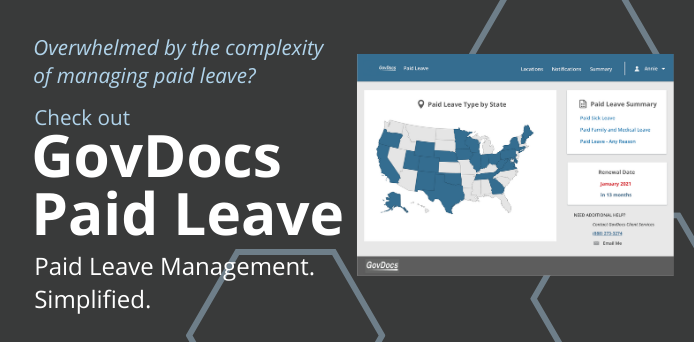EMPLOYMENT LAW NEWS
Texas Sexual Harassment Laws Strengthened
By Jana Bjorklund, GovDocs Senior Counsel and Director, Employment Law and Compliance
Published Aug. 25, 2021

In a surprising employee-friendly move for Texas, two bills signed into law by Gov. Greg Abbott change the landscape of liability for employers under Texas sexual harassment laws.
Texas sexual harassment laws have been strengthened.
In a surprising employee-friendly move for Texas, two bills signed into law by Gov. Greg Abbott change the landscape of liability for employers under Texas sexual harassment laws.
Effective Sept. 1, 2021, the protections for employees who bring forward sexual harassment claims in the workplace have been expanded under Senate Bill 45 and House Bill 21.
Employer Definition and Manager Liability
Texas sexual harassment law currently applies only to employers who have at least 15 workers.
SB 45 changes the definition of employer to one who “employs one or more employees,” or “acts directly in the interests of an employer in relation to an employee.”
Under the new law, employees of any size employer may now bring a sexual harassment claim against their employer. In addition, supervisors, managers and other professionals that “act directly in the interests of an employer in relation to the employee” may also be named defendants in a sexual harassment complaint.
This is a significant change from the prior law.
Related: Sexual Harassment Training in the #MeToo Era
Standard for Employer Response to Harassment Claim
Another item of note in these laws is the change in language as it applies to an employer’s response to these types of claims.
Employers are required to take “prompt remedial action” under the current Texas sexual harassment law. SB 45 changes that standard.
An employer commits an unlawful employment practice if a worker is sexually harassed and the employer or employer’s agent or supervisors:
- Know or should have known that the conduct constituting sexual harassment was occurring
- Fail to take immediate and appropriate corrective action
The statute, of course, does not define what “immediate and appropriate corrective action” means and will most likely be a source of litigation in the future. For now, employers will need to determine what that means for their organization.
Length of Time for Employee to File Claim
Employees will also have a longer length of time to file a sexual harassment claim in Texas.
SB 21 almost doubles the statute of limitations from 180 days to 300 days, effective Sept. 1, 2021.
Employers should note, however, that this only applies to sexual harassment claims. Other discrimination claims from employees are still subject to the 180-day statute of limitation.
Next Steps – Policy Review and Training
If employers haven’t done so already, they should review and, if needed, revise their employment policies regarding discrimination and sexual harassment.
Considering these new laws, employers’ policies in Texas should clearly outline their process for reporting and investigating claims of sexual harassment, including language addressing “appropriate corrective action,” if necessary, based on the results of the investigation.
Employers may also consider training employees and managers regarding sexual harassment prevention to mitigate risk.
Meanwhile, employees should understand the employer’s policy and how to report a claim if necessary.
Lastly, supervisors and managers should also understand the new standard for liability, the company policy and process for harassment reporting and investigation, and have a clear understanding how to identify when a complaint should be brought to HR.
Conclusion
The #MeToo era has ushered in a number of new laws related to sexual harassment in the workplace.
Additional training requirements, specific laws by industry and other legislation continues to impact employers. In recent years, several jurisdictions have implemented new laws. To name a few:
These and other new sexual harassment laws will continue to keep employers on their toes.
This Employment Law News blog is intended for market awareness only, it is not to be used for legal advice or counsel.
Keep Informed
with GovDocs Employment Law News
Learn More About GovDocs
About Jana

Jana Bjorklund, GovDocs Senior Counsel and Director, Employment Law and Compliance, joined GovDocs in 2019 and has extensive experience within global businesses, providing advice and counsel relative to compliance with employment laws.
What is GovDocs?
GovDocs simplifies employment law compliance for large, multi-jurisdiction employers in the U.S. and Canada. The GovDocs software platform integrates three solutions in one convenient place to help you master the employment laws impacting your business. Whether you manage a postings, minimum wage or paid leave program, our products cut through research time, provide proactive insights into the everchanging landscape of employment laws and reduce the risk of noncompliance. The company is headquartered in St. Paul, Minn.
Have fewer than 30 locations?
The GovDocs Poster Store simplifies posting compliance for employers with less than 30 locations across all industries, offering a variety of posting products to meet your labor law compliance needs.




